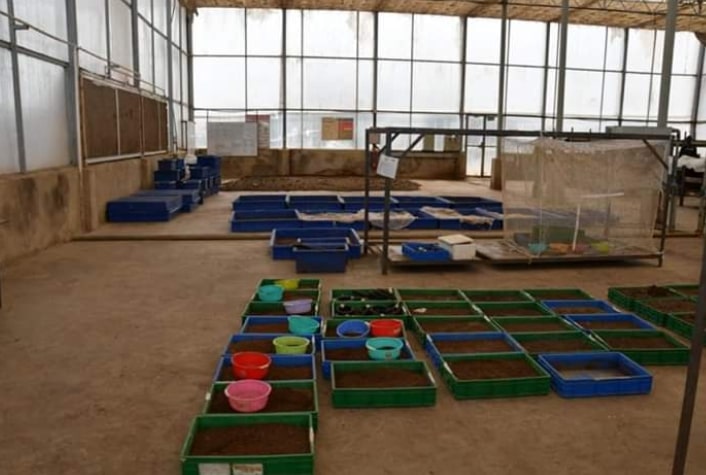Do you know that organic waste can be a good source of livelihood in form of products such as organic fertilizer, animal feed, briquettes and biogas among others? The private sector have a key role to play to take up the circular economy concept to change peoples attitudes about waste by exploiting these livelihood options. This would help us to deal with solid waste management problem in the country which is a menace in most urban centres whereby dumpsites dot every residential area and pose a health risk to people.

On 17th July 2020, the senior staff of the Ministry of Environment and Forestry toured one company that has embraced the concept of circular economy through a multi-million investment venture. Sanergy Limited is located at Kinanie in Athi River and has majored in processing organic waste through creation of opportunities and resources from the waste. As the Company’s Vision reads, the company is committed to promoting a clean and healthy environment as well ensure prosperity among members of the community. They have pursued these aspirations through perfecting the circular economy concept.

Circular Economy innovations by Sanergy Limited are timely and in tandem with the recently developed Sustainable Waste management Policy and Bill which adopted a circular economy approach whereby all waste is regarded useful and extraction of maximum value from waste is prioritized. The Waste management Policy and Bill was considered by Cabinet on 28th May 2020 and intends to create many jobs for Kenyans in the waste industry through waste recycling and composting.
Sanergy recycles organic and sanitation waste, to produce diverse products such as
- insect–based animal protein through the rearing of Black Soldier Fly larvae, which are fed on the waste
- organic fertilizer through thermophilic composting,
- briquettes
Source of organic waste that fuels Sanergy’s operations
Currently, Sanergy processes around 30 tonnes of organic waste daily. However, the company is currently in the process of completing a new plant that will process over 300 tonnes of organic waste daily.
Sanergy gets organic waste mainly from Nairobi City from two sources. One of the sources is faecal waste whereby the company has set up flashless toilets in low income settlement areas. The toilet is designed in such a way that the stool and urine are separated and disposed appropriately. Sanergy uses the solid stool as feed for the Black Soldier larvae.


Sanergy also receives organic waste from hotels and farm produce markets such as Wakulima market. This waste is preferred because it is not contaminated with pollutants such as cooking oils, left over medical drugs, and other chemicals used at home. Hence this organic waste decomposes easily and is good feed for the larvae.

Making of insect–based animal protein through the rearing of Black Soldier Fly larvae
Once received at Sanergy, the organic waste is used to feed the Black Soldier Fly larvae, which is reared in a controlled environment.

It is estimated that the larvae consume 70% of the organic waste. The remaining 30% residue is a raw material for the next step of development of organic fertilizer. Hence nothing gets wasted.

Once the worms grow to a suitable size which normally takes 9 days, the worms are harvested. This involves sieving them out of the residual organic waste.

The worms are then killed by subjecting them to high temperatures. They are later washed clean and dried. Washing helps to remove harmful microbes such as E coli

The worms are later packed for the market. The main customers are the makers of animal feeds where they are used for protein enrichment. The market for animal protein for feeds enrichment is currently very high. This is an untapped opportunity which can contribute to reduction in disposal of valuable organic waste in Dandora dumpsite and instead use it for generating employment, livelihood and wealth for Kenyans.

Making of organic fertilizer
The residual 30% from the worms and any other organic waste is taken to a yard where it is mixed with bagasse and other enrichment to make organic fertilizer.

Making of the fertilizer is a scientific process that involves turning and mixing as well as aeration of the substrate to enable the microorganisms responsible for organic waste degradation to work optimally. At Sanergy, aeration of the organic waste through turning of the waste is mechanized. Water is also added in appropriate quantities to maintain suitable moisture content.

After turning, mixing and aeration, the waste is covered using a semipermeable cloth which prevents loss of moisture from the organic waste and hence keep the environment conducive for the microbes. The temperature is also checked regularly to ensure optimum operation of the microorganisms throughout the organic fertilizer making process.

Once the organic fertilizer is ready, quality checks are conducted to ensure that it is of high chemical and physical quality. The product is then weighed and stored in 50kgs sacks and taken to the market. According to Sanergy, there is a huge market for organic fertilizer especially by flower farms and organic farming.

Making of briquettes
Besides making protein animal feeds and organic fertilizer, Sanergy also converts organic waste into briquettes for cooking. This is an important product which is used as a source of energy for cooking.

Recently, Sanergy procured additional modern equipment that will make many briquettes every day. They intend to use some of the briquettes as a source of energy in the factory while some will be sold in supermarkets and other retail outlets.

Conclusion
Circular economy is the new discourse in sustainable development. Sanergy has successfully demonstrated practically that organic waste is a valuable resource and can create many jobs for Kenyans. Nairobi generates 1800 tonnes of organic waste daily and since Sanergy can process 300 tonnes daily, we need 6 such facilities to get rid of organic waste in Nairobi city.

